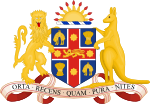Industrial Relations Commission of New South Wales
 From Wikipedia the free encyclopedia
From Wikipedia the free encyclopedia
| Industrial Relations Commission of New South Wales | |
|---|---|
 | |
| Established | 2 September 1996 |
| Jurisdiction | New South Wales, Australia |
| Authorised by | Parliament of New South Wales via the Industrial Relations Act 1996 (NSW) |
| Website | www.irc.justice.nsw.gov.au |
| President | |
| Currently | Hon Justice Ingmar Taylor |
The Industrial Relations Commission of New South Wales conciliates and arbitrates industrial disputes, sets conditions of employment and fixes wages and salaries by making industrial awards, approves enterprise agreements and decides other industrial matters in New South Wales, a state of Australia. The Commission was established with effect from 2 September 1996 pursuant to the Industrial Relations Act 1996.[1]
History
[edit]The Court of Arbitration (New South Wales) was established in 1901 pursuant to the Industrial Arbitration Act 1901 (NSW). The name and function of the state's industrial tribunal has since undergone several changes. It was renamed the Industrial Court in 1908,[2] and the Court of Industrial Arbitration (New South Wales) in 1912.[3] The Industrial Arbitration (Amendment) Act, 1926 (NSW) abolished the Court of Industrial Arbitration and set up the Industrial Commission of New South Wales, which was abolished in turn by the Industrial Relations Act 1991 (NSW) and replaced by the Industrial Relations Commission and a separate Industrial Court.
The Industrial Relations Act, 1996 (NSW) established a new Industrial Relations Commission which had an arbitral and judicial function.[4] When in was in Court Session, the Commission was called the Industrial Court of New South Wales. In 2016 the Industrial Court was abolished and its powers transferred to the Supreme Court of NSW.[5]
The Industrial Court was revived by the Industrial Relations Amendment Act 2023 (NSW) and recommenced operation on 1 July 2024.[6]
Jurisdiction
[edit]The Commission has jurisdiction in relation to public sector and Local Government employees in New South Wales. The Industrial Relations (Commonwealth Powers) Act, 2009 (NSW) transferred jurisdiction over private sector workers to the federal relations system.
The Commission has the function of setting remuneration and other conditions of employment for employees, resolving industrial disputes, hearing and determining other industrial matters such as claims for unfair dismissal, unfair contract, victimisation and disciplinary appeals. The Minister for Industrial Relations may refer any matter to the Commission for the Commission to inquire and report upon.[7]
In exercising its jurisdiction, the Commission must take into account the public interest, the objects of the Industrial Relations Act 1996 (NSW), the state of the economy of New South Wales and the likely effect of its decisions on the economy, and, for the exercise of a function about public sector employees, the Government's fiscal position and outlook and the likely effect of its decisions on that fiscal position and outlook.[8]
The Commission may sit as a Full Bench for the purposes of hearing appeals against the decisions of single members, making a State Decision which affects the employment of New South Wales employees or to determine difficult questions referred by a single member to the Full Bench for determination. The Industrial Court can also sit as a Full Bench to hear an appeal against the decision of a single Industrial Court judge or an Industrial Magistrate of the Local Court.
Composition
[edit]The Commission consists of a President, Vice President, Deputy President and Commissioners appointed by the Governor of New South Wales. The President, Vice President and Deputy Presidents are referred to as Presidential Members and are also Judges of the Industrial Court of New South Wales.
A Full Bench of the Commission consists of at least three members including at least one Presidential Member. A Full Bench of the Industrial Court consists of three Presidential Members sitting as Judges.
The Commission's current composition is:[9]
| Position | Name | Notes |
|---|---|---|
| President | Hon Justice Ingmar Taylor | |
| Vice President | Hon Justice David Chin | |
| Deputy President | Hon Justice Jane Paingakulam | |
| Senior Commissioner | Nichola Constant | |
| Commissioner | Damian Sloan | |
| Janine Webster | ||
| Christopher Muir | ||
| Daniel O'Sullivan | ||
| Janet McDonald |
See also
[edit]References
[edit]- ^ Industrial Relations Act 1996 (NSW).
- ^ Industrial Disputes Act 1908 (NSW).
- ^ Industrial Arbitration Act 1912 (NSW).
- ^ "Our History". Industrial Relations Commission. Government of New South Wales. Retrieved 29 June 2017.
- ^ Industrial Relations Amendment (Industrial Court) Act 2016 (NSW)
- ^ "New era of industrial relations in NSW as Industrial Court begins work today". Communities and Justice. Retrieved 26 July 2024.
- ^ Industrial Relations Act 1996 (NSW) s 146.
- ^ Industrial Relations Act 1996 (NSW) s 146(2).
- ^ "Members of the Industrial Relations Commission". Industrial Relations Commission. NSW Government: Attorney General and Justice. Retrieved 12 September 2022.
External links
[edit]- www.irc.justice.nsw.gov.au Homepage of the Industrial Relations Commission
- Annual Review 2015 (PDF). Industrial Relations Commission of New South Wales. 2015. ISSN 1832-2093.